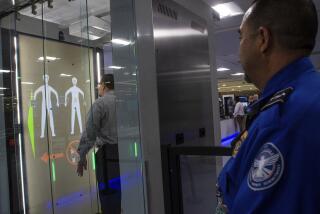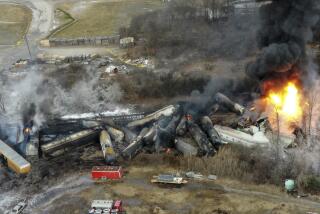TSA to soon allow fliers to carry small folding knives on planes
The Transportation Security Administration will soon let airline passengers carry small folding knives on planes for the first time since the Sept. 11, 2001, terrorist attacks.
But a group of flight attendants is doing everything it can to halt the shift in policy. It has even employed the families of flight attendants who died in the terrorist attacks to put pressure on the TSA.
Still, TSA is set April 25 to allow passengers to bring onboard small folding knives, with blades 2.36 inches or shorter and less than 1/2 an inch wide, as well as pool cues, ski poles, hockey sticks, lacrosse sticks, golf clubs and novelty-size bats.
The policy change is intended to give TSA agents more time to focus on bigger threats, such as explosives.
In the last few weeks, the Assn. of Professional Flight Attendants, which represents American Airlines attendants, has sent letters to the TSA and others, voicing opposition to the change.
One letter to TSA chief John Pistole included a message from Mike Low, the father of Sara Elizabeth Low, an American Airlines flight attendant who died in the Sept. 11 attacks. He urged Pistole to “please reconsider this terrible decision,” saying it will only increase the risk to passengers and flight crews.
In another letter, Harry Ong Jr. called the new policy “reprehensible.” His sister Betty Ann Ong, an American Airlines flight attendant, also died in the terrorist attacks. Instead of easing TSA screening policies, Ong said, the agency should increase enforcement.
“We must maintain our air security vigilance with full force and effect and not let our guard down for one moment,” he said.
A spokesman for the agency said Pistole has not changed his mind.
•Climate change may boost turbulence
In the future, white-knuckle fliers may be able to blame those brutally bumpy flights over the Atlantic on greenhouse gases.
Turbulence will be stronger and occur more often if carbon dioxide emissions double by 2050, heating up the atmosphere, according to a study by British scientists published last week in the journal Nature Climate Change.
Turbulence is created by atmospheric pressure, jet streams, air around mountains, cold or warm weather fronts, or thunderstorms, among other conditions. Severe turbulence is responsible for 58 passenger injuries a year, according to the Federal Aviation Administration. From 1980 to 2008, 298 passengers on U.S. airlines were injured and three died because of turbulence accidents, the agency said.
The study by scientists at the universities of Reading and East Anglia said the chances of running into turbulence over the Atlantic will increase 40% to 170% by the middle of the century, with turbulence strength increasing 10% to 40%.
In fact, turbulence may already be worse because of climate change, and emissions from airlines are a big contributor, the study said.
“Aviation is partly responsible for changing the climate,” the study said. “But our findings show for the first time how climate change could affect aviation.”
• Shifting aisle seat would ease boarding
An airline seat that shifts to make boarding easier sounds like a crazy idea, but don’t be surprised to find it on your next flight.
The “side-slip seat” is a concept by Molon Labe Designs, a Denver airline interior company that introduced the idea for the first time to airlines and manufacturers last week at the Aircraft Interiors Expo in Hamburg, Germany. The president of the company said the seat design was a big hit at the expo.
Here’s how it works: Imagine a row of three seats on a plane. The seat along the aisle will slide up and over the middle seat to widen the aisle and speed up the loading of passengers. Once the passengers are ready to sit down, the aisle seat can slide and lock back into place.
Once the seat is certified for use by the U.S. Department of Transportation and ready for production, don’t be surprised if several low-cost airlines order and install the seat, Molon Labe founder Hank Scott said after the expo.
“I can honestly say now that this seat, flying with short-haul and low-cost carriers, is not a matter of if but when,” he said.






